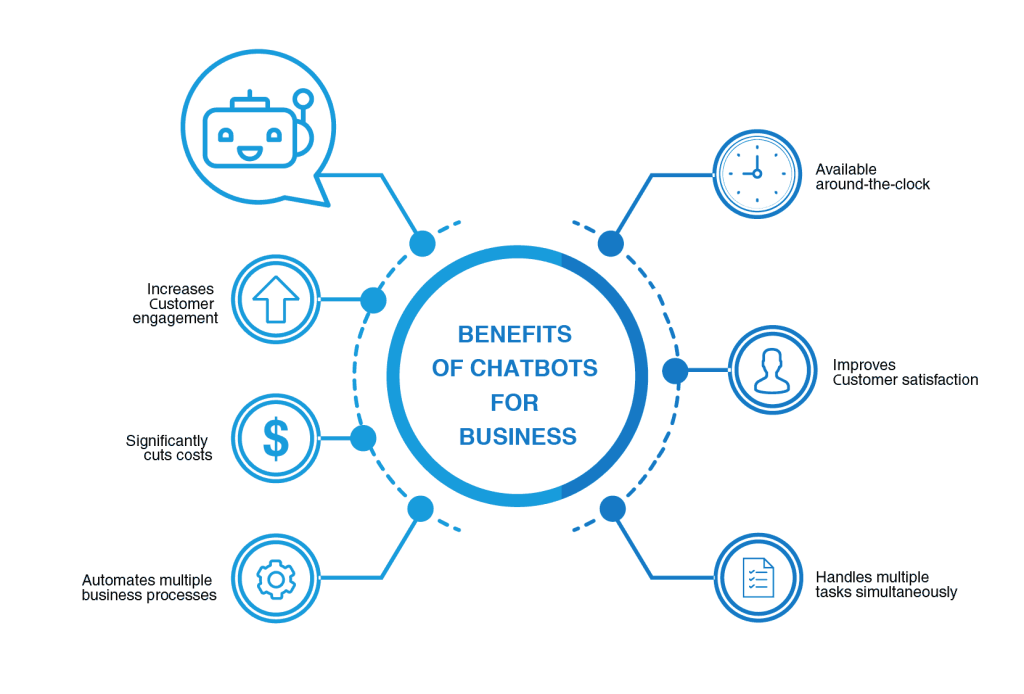
What are Chat-bots?
Chatbots are computer programs or artificial intelligence (AI) applications designed to simulate human conversation and interact with users through textual or auditory interfaces. They are deployed on various platforms such as websites, messaging apps, mobile apps, or voice assistants to provide a conversational experience similar to human-to-human interaction.
Using natural language processing (NLP) and machine learning algorithms, chatbots analyze user input, understand the context, and generate appropriate responses.
They can operate in two main types:
- Rule-based chatbots: These chatbots follow predefined rules and patterns to determine their responses. They use a decision tree or flowchart to match user input with predefined rules and provide corresponding answers. Rule-based chatbots are suitable for handling simple and structured inquiries.
- AI-powered chatbots: These chatbots leverage artificial intelligence and machine learning techniques to understand user inputs and generate responses. They utilize NLP models to interpret and analyze natural language, learning from user interactions to improve their responses over time. AI-powered chatbots can handle more complex inquiries and adapt to user preferences.
Chatbots find applications in various domains, including customer support, virtual assistants, information retrieval, e-commerce, appointment scheduling, and more. They offer benefits such as 24/7 availability, scalability, quick response times, and personalized interactions, making them valuable tools for businesses to enhance customer service and automate routine tasks.
It is important to note that while chatbots have advanced capabilities, they are context-dependent, and complex or emotionally sensitive interactions may still require human intervention to ensure empathy and understanding. Achieving the right balance between automation and human involvement is crucial for providing an optimal user experience with chatbots.
What are AI Chat-bots?
AI chatbots, often referred to as artificial intelligence chatbots, are computer programs or applications that utilize artificial intelligence technologies to engage in conversations with users. These chatbots are designed to simulate human-like interactions and provide assistance or information based on user input.
AI chatbots employ natural language processing (NLP) techniques to understand and interpret user messages. They analyze the structure, context, and meaning of the input to derive the user’s intent and extract relevant information. Machine learning algorithms are utilized to train the chatbot models and improve their performance over time.
Key characteristics of AI chatbots include:
- Natural Language Processing: AI chatbots use NLP algorithms to process and understand human language. They can handle text-based conversations and recognize patterns, entities, and intent within user messages.
- Machine Learning: AI chatbots leverage machine learning algorithms to train their models and improve their conversational abilities. They learn from user interactions, feedback, and data to enhance their responses and adapt to various scenarios.
- Context Awareness: AI chatbots have the ability to maintain context during a conversation. They can remember previous user interactions, retain information, and provide more coherent and personalized responses based on the conversation history.
- Intent Recognition: AI chatbots aim to understand the intent behind user queries. They identify the purpose or goal of the user’s message and tailor their responses accordingly, providing relevant information or performing specific tasks.
- Sentiment Analysis: AI chatbots can analyze the sentiment expressed in user messages. They can detect positive, negative, or neutral sentiment, allowing them to respond with appropriate tone and empathy.
AI chatbots are employed in various applications, including customer support, virtual assistants, e-commerce, content recommendation, and more. They offer benefits such as 24/7 availability, scalability, faster response times, and personalized interactions, contributing to improved customer experiences.
It’s important to note that while AI chatbots can handle a wide range of inquiries, they may still require human intervention in complex or emotionally sensitive situations. Striking the right balance between automated AI capabilities and human assistance ensures a successful and satisfactory user experience with AI chatbots.
Why are chatbots important for business?

Chatbots are essential for businesses due to the following reasons:
- Improved Customer Service: Chatbots enable businesses to offer prompt and personalized customer support. They can handle customer inquiries, provide information, assist with common issues, and deliver real-time help 24/7. This leads to enhanced customer satisfaction and fosters strong customer relationships.
- Cost Efficiency: By automating routine and repetitive tasks, chatbots reduce the need for human agents to handle basic inquiries. This improves operational efficiency and cost-effectiveness for businesses, allowing them to handle a higher volume of inquiries without significant increases in staffing requirements.
- Scalability: Chatbots have the ability to handle multiple customer interactions simultaneously, enabling businesses to scale their customer support operations efficiently. During peak periods or sudden spikes in inquiries, chatbots can manage the increased demand without compromising response times or quality.
- Increased Sales and Conversions: Chatbots can serve as virtual sales assistants, guiding customers through the purchasing process, making personalized product recommendations, and addressing customer concerns. By providing timely assistance and tailored recommendations, chatbots contribute to increased sales and conversion rates.
- Enhanced Lead Generation: Chatbots can engage with website visitors or social media users, collect contact information, and qualify leads. By initiating conversations and capturing potential customer details, chatbots support lead generation efforts, allowing businesses to nurture and convert leads into customers.
- Time Efficiency: Chatbots provide immediate responses to customer inquiries, eliminating wait times and reducing customer frustration. This saves time for both customers and businesses, enabling faster issue resolution and improved overall efficiency.
- Data Collection and Insights: Chatbots can gather valuable data during customer interactions, including preferences, purchase history, and frequently asked questions. This data can be analyzed to gain insights into customer behavior, preferences, and pain points, informing business strategies, marketing campaigns, and product improvements.
- Brand Consistency: Chatbots deliver consistent and standardized responses based on predefined rules and guidelines. This ensures that customers receive a uniform experience and messaging, helping to maintain brand consistency and align with the brand’s values.
- Multi-platform Availability: Chatbots can be deployed across various platforms, including websites, messaging apps, social media platforms, and voice assistants. This allows businesses to engage with customers on their preferred channels, expanding their reach and maximizing customer interactions.
By leveraging the capabilities of chatbots, businesses can streamline customer interactions, improve efficiency, and provide personalized experiences. It is important for businesses to tailor chatbots to their specific needs and ensure that they complement human interactions when necessary, in order to deliver optimal customer service and achieve a competitive edge.
How Chatbots Enhance Customer Experience Across Industries

Chatbots significantly enhance the customer experience across industries in the following ways:
- Instant and 24/7 Support: Chatbots offer immediate and round-the-clock assistance to customers, ensuring that their queries are addressed promptly. This availability improves convenience and customer satisfaction.
- Personalized Interactions: By leveraging data and artificial intelligence (AI), chatbots provide personalized interactions. They analyze customer preferences, purchase history, and behavior to offer tailored recommendations, relevant information, and personalized solutions, creating a more individualized experience.
- Efficient Issue Resolution: Chatbots efficiently handle customer inquiries and resolve issues. They can provide instant solutions, step-by-step guidance, or troubleshoot problems, minimizing wait times and reducing customer frustration. This leads to faster resolutions and improved customer satisfaction.
- Seamless Multichannel Support: Chatbots can be deployed across various channels, including websites, mobile apps, messaging platforms, and social media. This enables customers to have a consistent experience and engage with businesses through their preferred communication channels.
- Enhanced Self-Service Capabilities: Chatbots empower customers with self-service options. They assist users in finding information, accessing account details, placing orders, or tracking deliveries. By enabling self-service, chatbots streamline the customer journey and empower customers to obtain information independently.
- Reduced Customer Effort: Chatbots aim to minimize customer effort by simplifying processes and providing easy access to information. They can guide customers through complex procedures, offer automated forms or FAQs, and help users navigate products or services, ensuring a smooth and effortless experience.
- Proactive Engagement and Notifications: Chatbots can proactively engage with customers through personalized notifications, updates, or reminders. They offer order status updates, appointment confirmations, or relevant promotions, keeping customers informed and engaged throughout their journey.
- Continuous Learning and Improvement: Chatbots learn from customer interactions and continuously improve their responses. Analyzing user feedback and behavior allows chatbots to identify areas for enhancement, adapt to changing customer needs, and provide better assistance over time.
- Cost Savings for Businesses: Chatbots automate routine tasks and handle a large volume of inquiries, reducing the workload for human agents. This leads to cost savings while maintaining quality customer service. Human agents can focus on more complex and high-value interactions, enhancing overall operational efficiency.
Chatbots have diverse applications across industries, including e-commerce, banking, healthcare, travel, and more. Their implementation allows businesses to provide efficient, personalized, and accessible support, resulting in improved customer satisfaction, loyalty, and an enhanced overall customer experience.
Future of AI Chatbot Technology
The future of AI chatbot technology is poised for exciting advancements and possibilities. Here are some potential trends and developments to anticipate:
- Advanced Natural Language Processing (NLP): AI chatbots will continue to improve their language understanding capabilities, enabling more accurate and natural conversations with users. Their ability to grasp context, nuances, and intent will enhance the overall conversational experience.
- Contextual Understanding: Future chatbots will excel in understanding and retaining context throughout conversations. They will be able to remember past interactions, allowing for more seamless and personalized interactions over time.
- Emotional Intelligence: AI chatbots may incorporate emotional intelligence, enabling them to recognize and respond to human emotions. They will adapt their tone, empathy, and responses based on the user’s emotional state, providing more empathetic and personalized interactions.
- Multilingual and Multimodal Capabilities: Chatbots will become more versatile in handling multiple languages and modes of communication. They will be able to process text, speech, images, and gestures, providing a more comprehensive and inclusive user experience.
- Integration with Voice Assistants: AI chatbots will seamlessly integrate with voice assistants such as Siri, Alexa, or Google Assistant. Users will be able to engage in voice-based conversations with chatbots, expanding the accessibility and usability of the technology.
- Deeper Integration with Business Systems: Chatbots will integrate more extensively with various business systems, including customer relationship management (CRM) platforms, e-commerce systems, or inventory management tools. This integration will enable chatbots to access real-time data and provide personalized and accurate information to users.
- Improved Personalization: Future chatbots will leverage advanced algorithms and data analysis to deliver highly personalized experiences. They will utilize user data, preferences, and behaviors to offer tailored recommendations, anticipate user needs, and provide proactive assistance.
- Enhanced Security and Privacy: AI chatbots will prioritize robust security measures and data privacy to protect user information. Strong encryption, authentication protocols, and compliance with privacy regulations will be paramount in ensuring user trust and safeguarding sensitive data.
- Human-Agent Collaboration: Chatbots will seamlessly collaborate with human agents, facilitating a hybrid model of customer support. They will intelligently escalate complex queries to human agents while providing relevant background information, resulting in efficient and effective problem-solving.
- Ethical and Responsible AI: The development of chatbots will increasingly prioritize ethical considerations and responsible AI practices. Bias mitigation, transparency, explainability, and adherence to ethical guidelines will be critical to ensure fairness, accountability, and user trust in AI chatbot interactions.
As AI technology advances, the future of chatbots holds immense potential for more natural, personalized, and intelligent interactions. They will continue to revolutionize customer service, elevate user experiences, and drive innovation across various industries.
benefits of chatbots for companies and customers

Benefits for Companies:
- Cost Savings: Chatbots help reduce costs by automating customer interactions and reducing the need for human agents to handle routine inquiries, resulting in optimized resource allocation.
- 24/7 Availability: Chatbots provide round-the-clock customer support, ensuring that customers can receive assistance at any time, improving customer satisfaction and extending support beyond regular business hours.
- Scalability: Chatbots can handle multiple customer interactions simultaneously, allowing businesses to scale their customer support operations without significant increases in resources, ensuring efficient handling of high volumes of inquiries.
- Increased Efficiency: Chatbots provide instant responses to customer queries, reducing response times and improving overall efficiency. They can handle multiple inquiries simultaneously, minimizing customer wait times and speeding up issue resolution.
- Personalized Experiences: Chatbots leverage customer data and preferences to offer personalized recommendations and assistance. By tailoring interactions based on individual profiles, chatbots enhance the overall customer experience and foster engagement.
Benefits for Customers:
- Instant Support: Chatbots offer immediate assistance, providing instant responses to customer inquiries and eliminating the need to wait for human agents, ensuring prompt issue resolution.
- 24/7 Availability: Chatbots are available round-the-clock, enabling customers to seek support at their convenience, even outside of regular business hours.
- Quick and Convenient Interactions: Chatbots enable customers to interact through familiar messaging platforms, offering a convenient and comfortable communication channel. Customers can ask questions, seek information, or resolve issues with ease.
- Self-Service Options: Chatbots empower customers with self-service capabilities, guiding them through processes, providing automated forms, or offering step-by-step instructions, allowing customers to find information or perform tasks independently.
- Consistent and Accurate Information: Chatbots deliver consistent and accurate information as they follow predefined rules and access up-to-date knowledge bases. Customers can rely on chatbots to provide reliable and standardized responses, reducing the risk of misinformation.
- Improved Response Times: With chatbots’ ability to handle multiple inquiries simultaneously, customers experience faster response times and quicker issue resolution, enhancing customer satisfaction and reducing wait times.
- Accessibility and Convenience: Chatbots are accessible on various devices and platforms, enabling customers to engage using their preferred communication channels, making assistance easily accessible and convenient.
Chatbots provide significant benefits for companies and customers alike, streamlining customer interactions, improving efficiency, offering personalized experiences, and enhancing overall customer satisfaction. By leveraging chatbot technology, businesses can optimize their customer service capabilities and build stronger customer relationships.
Thanks,






Leave a Reply
You must be logged in to post a comment.